What is a Slug and How To Optimize it For SEO
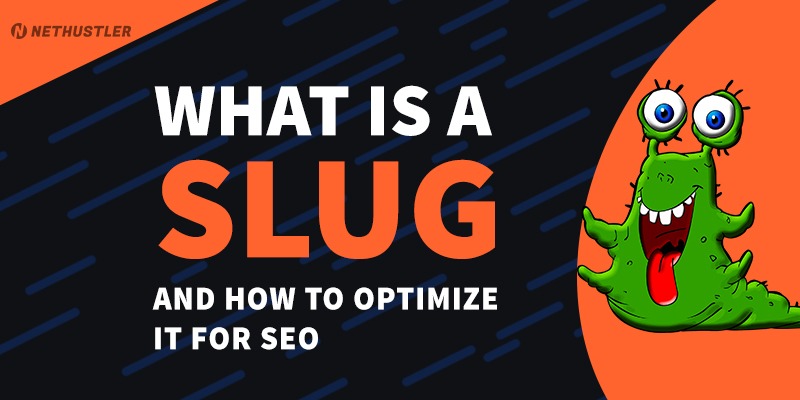
Alright, I know some of you blog veterans might already be familiar with this, but there are quite a few beginner bloggers who don’t know what is a slug and why it’s important for SEO.
So, in this article, I’m going to go over a few notes about slugs and how to optimize them for search engines (SEO)
What is a slug?
A slug in SEO is part of text in the URL that comes after the domain TLD (like .com). One of the main reasons to use slugs or SEO friendly URLs is to make it easier for users and search engines to quickly identify the context of a page.
That’s essentially the short description, just in case you were imagining that I was talking about these slugs:

So to make it clear, I’m talking about URL (uniform resource locator, meaning a website address) slugs like these ones:
- https://nethustler.com/how-to-start-a-blog – The slug is the “How-to-start-a-blog” part.
- https://nethustler.com/affiliate-marketing-guide – Here the URL slug is “affiliate-marketing-guide”
- https://nethustler.com/cheap-website-traffic – Yep, the URL slug for this one is “cheap-website-traffic”.
Basically, everything that’s after the .com/ is what we call a slug in the SEO world.
Is it important? Heck yeah.
You see, a long time ago, having your main keyword phrase as a domain name like: “buyflowers.com” would make it easier for the site to rank for the keywords like, you guessed it: “Buy flowers”
Nowadays though, that’s not the case anymore, since Google has introduced a couple of updates to their core search algorithms to effectively put an end to that.
So now, we have slugs… that work kinda in the same way, but they are not as powerful. Still, they are very important to utilize slugs correctly when you’re trying to get more organic traffic.
Why are slugs important for SEO?
Creating SEO friendly URLs or slugs, has a number of benefits.
- It easy for search engine spiders and crawlers such as the Googlebot to quickly identify what a page is all about, simply by reading the slug even before they start scanning the rest of the content, they know that the page should be about AdSense arbitrage.
- Not only is it useful for SEO but slugs also help your readers to quickly know what a post is about or remember the address much easier for a later date. An URL: https://nethustler.com/adsense-arbitrage makes it clear to the user that the post is about AdSense arbitrage.
WordPress Slugs
When you first create a blog on WordPress, the default URL format also known as permalinks will have weird numbers in them that are not easily identifiable such as: nethustler.com/?p=123
How is that easy to identify by either your blog readers or by Google or other search engines?
To change your WordPress permalinks to SEO-friendly slugs, go to Settings > Permalinks and choose the “Post name” option.
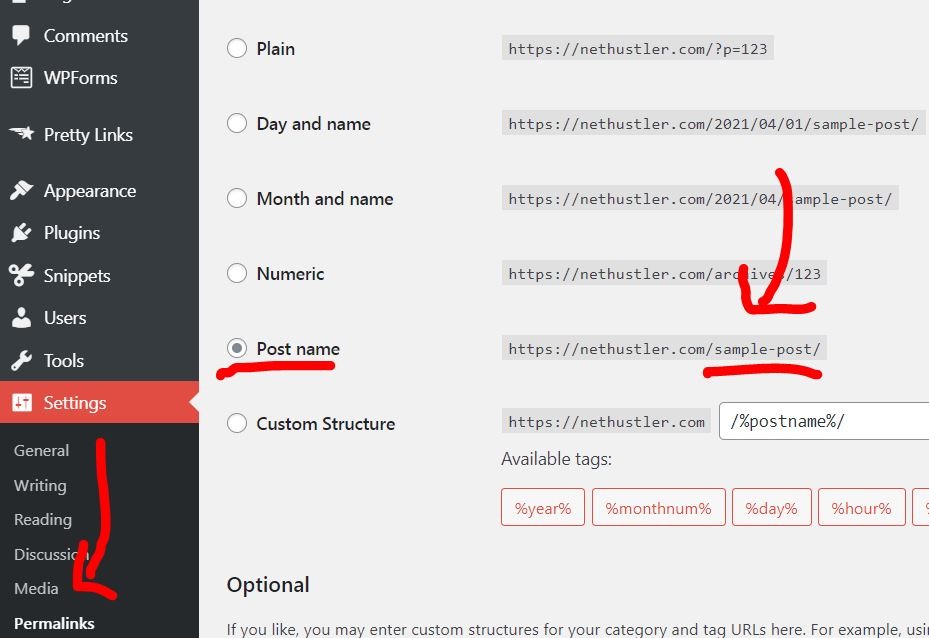
This will make it so that WordPress will automatically use only the title of your posts as URL slugs and nothing else.
But wait there’s more…
You could also manually modify the slugs of all your posts. So for example, if you go to a post you could change it from the post settings.
If you’re using WordPress with Gutenberg (the new interface of WordPress) then it would look like this:
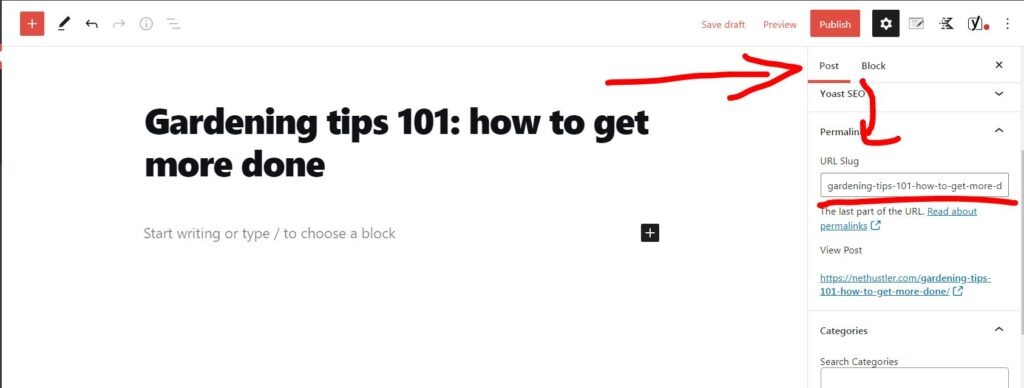
Go to Post then look for where it says Permalink, and under the URL slug, you can manually edit it.
Since we’ve told WordPress to always use our post title as a slug, it did exactly that, no numbers, categories and other things. Just our title separated by dashes.
However we can take this a step further and to make it full SEO friendly, we can edit the slug so that our post final URL would be just: /gardening-tips, like so:
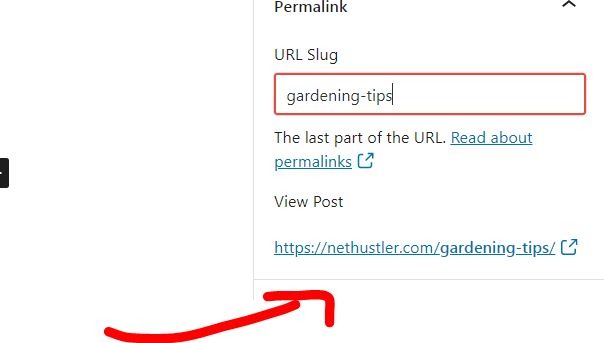
See how much better that looks and how much easier it gets to instantly know what a page or a post is all about?
That’s why slugs are important, and not only for WordPress, this applies to every CMS and static website on the internet.
If you’re website is static (meaning you only use html files on a server), then the names that you give to each html or php file will determine the URL slug.
How to optimize slugs for SEO
A couple of things to keep in mind when optimizing your slugs for SEO.
Insert only your main keyword in the slug
So as with the example from above, you only want to have your main keyword inside the slug, for example “Gardening tips” instead of the full “gardening tips 101, how to get more stuff done”.
This ensures that the search engine spiders and crawlers that come to analyze your page to index it, will have a faster and easier time of understanding what the post is all about.
Short URL slugs are better
You want to keep your slugs short, like I’ve said above, ideally only focusing on your main keyword or keyword phrase.
Adding too many words and numbers to your URL will only make it harder and more difficult for people to remember your name and for search engines to give your post preferential treatment.
Listen, I’m not saying that by using slugs for SEO correctly you will immediately rank in top positions for difficult keywords. That’s far from it.
But it does help a little bit. Especially if someone is searching for the exact term and your post’s slug has exactly just that.
But forget about SEO for a second, and just think, what do you think looks better to you and would make the most sense for your readers to remember your site?
I bet you would choose a short URL slug such as: example.com/smart-decision 😉 instead of example.com/?p=432
It’s also helpful to have a short slug in case you want to write more posts about a certain topic, so this will make it much easier for you to organize things and keep your URLs friendly.
Only use dashes for space
Remember to only use dashes in your slugs, no underscores or anything else. These days WordPress (if you’re using Gutenberg interface) will automatically add hyphens only to your URL slug anyway, so you’re good.
Why only dashes? Don’t ask me, it seems they are more friendly and easier to remember, and they are generally preferred by the vast majority of the sites compared to underscores.
Don’t use stop words
Stop words are basically words like: “the”, “and”, “is”, “of”, etc.
There are a couple of reasons for this:
- It makes the URL much longer than needed
- Harder for users to remember
A word of caution here, always change your slugs and remove stop words BEFORE you publish your posts.
Sure you can do that afterwards as well, but say for example if you have used the original URL with the big slug in other articles and on social media, or you have received backlinks from others sites, then changing the slug now will break that link.
You want to make sure you use 301 redirects for old slugs to redirect people to the new URL with the new slug if you’re editing the slugs of old posts.
So if possible always try to do this before you publish your articles because it would be a pain in the a$$ to manually edit hundreds or thousands of posts and 301 redirect them.
Use only lower case words
This one might not make that much sense to you, but trust me, WordPress and server software such as Apache is configured in such a way that they can distinguish between words or characters in URLs that are either lowercase or uppercase.
So for example: nethustler.com/Cheap-traffic-sources will give you to a 404 (page not found) error, while nethustler.com/cheap-traffic-sources will send you to the actual post.
There is only one difference between the two URLs, and in case you didn’t notice it, it was the uppercase C that broke the link.
So always use lower-case words in your slugs.
Conclusion: What are slugs?
As you can see, this post was not really about snails as you might have thought 😉
Slugs are an important component both for your website’s SEO and your users. Setting up your WordPress slugs is as easy as pie, and you should always try and use these SEO and human friendly URLs versus the number generated ones.
I hope this post helped you out, let me know down in the comments if you cared or didn’t cared about website slugs until now.
Stay hustlin’
Stephen

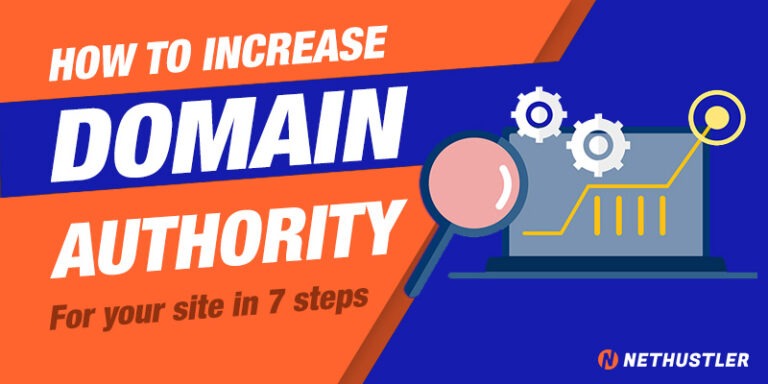
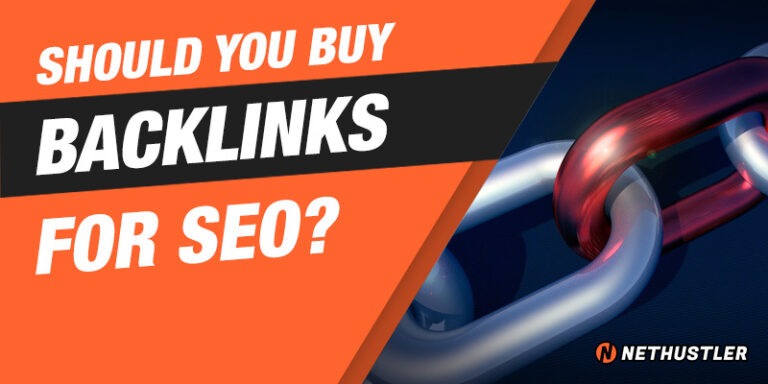




You’re welcome.
Good luck,
Stephen
I lol’ed at the slug picture.
Good to hear lol.